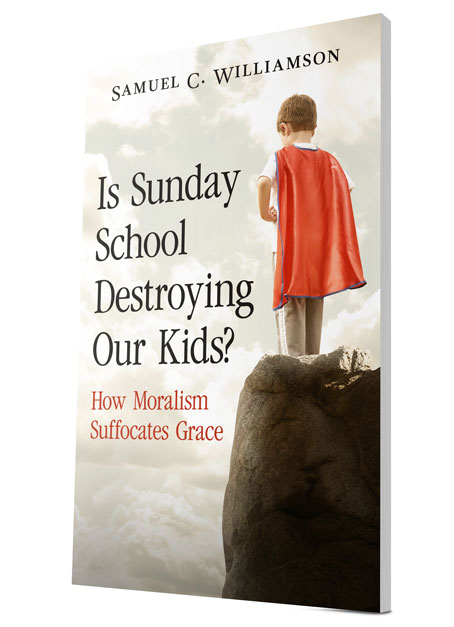When I was nine years old, I hit my sister. (I’m sure she deserved it). My parents were not happy. They sat me on the sofa. They told me that my behavior was unacceptable. They asked me if I wanted to be the kind of person who retaliates with violence.
And then they orchestrated unpleasant consequences.

I don’t remember the actual consequences, but whatever they were, they worked. In the following fifty-five years, I never again retaliated with (or even used) violence.
But the motivations for my “morality” are highly suspicious. My parents first appealed to my pride (I didn’t want to be that kind of person), and then they appealed to my comfort (I didn’t want to experience those kinds of consequences). In other words:
My parents taught me morality by appealing to my self-centeredness.
What’s Our Problem?
The problem with the world is that people lie, cheat, and steal. And we lie, cheat, and steal precisely because we are self-centered. Much of our moral teaching substitutes one form of selfishness (cheating and stealing) with another (identity and comfort).
We’re curing heart disease with cancer, and it’s spreading to our bones. Someday our well-nourished selfishness will no longer be offset by our selfish identity or comfort; and then we’ll lie, cheat, or steal. After all, we’ve been taught to act out of selfishness.
Scripture promises that someday the law will be “written on our hearts.” God doesn’t merely mean the law will be memorized. He means our hearts will be changed. He promises that someday we’ll reject violence because we love others, not just because we fear the consequences (or just because we love ourselves!).
You can see it in the story of Jonah.
The Curious Case of Jonah’s Heart
Jonah’s story is famous because of the “whale thing.” Instead of the whale, let’s look at Jonah’s heart. His story begins with a voice: “Jonah, go to Nineveh and preach” (Jonah 1:2). Jonah disobeys and flees. God then orchestrates a consequence, the whale.
The voice comes a second time. This time Jonah obeys and goes to Nineveh. But his heart is still hard. He preaches the world’s least loving sermon: “You’re all going to burn, and I’m going to roast marshmallows” (Jonah 3:4—slightly paraphrased).
The prophet doesn’t even offer the option of repentance—yet, despite his oversight, the Ninevites repent of their evil and violence (Jonah 3:5–8).
God relents of his judgment, and Jonah is angry. (What? No consequences for those nasty people!) God then orchestrates a plant to grow, and it comforts Jonah from the heat. Then God arranges for the comfort to disappear. And Jonah becomes furious.
Finally, God’s voice speaks one last time: “You have compassion for a mere plant, but you did nothing to make it grow, and it came and went in a day…. Should I not have compassion on 120,000 people who do not even know their right hand from their left?”
Jonah’s heart melts. The law is finally written on it. He loses his self-centeredness.
How Do We Know?
We know his heart is changed because the book of Jonah was written … by Jonah.
In it, Jonah describes his own sinfulness. He confesses his disobedience; he describes his own bigotry and hatred of the Ninevites; he shows his desire that they receive punishment, not mercy; he expresses anger at God for showing mercy; and he confesses his own selfish pettiness at the loss of a plant.
Only a changed heart can do that. The story of Jonah is the story of a man confessing his self-righteousness. Prior to God’s Voice and Orchestrations, Jonah could easily have prayed, “Lord, thank you that I’m not like those evil Ninevites.” Afterward, Jonah would have prayed, “Lord have mercy on me, a sinner.”
Jonah is the story of a man who rested in his own good heart who God changed to rest in God’s good heart.
There is an unwritten final question in the book of Jonah: What will we do with our hearts? Will we be the self-righteous man whose hard heart prays, “Thank you Lord that I’m not wicked like these sinners?”
Or will we be like the changed man whose tender heart prays, “Lord, have mercy on me a wicked sinner?”
Sam
P.S. This article is an excerpt from my book, Is Sunday School Destroying Our Kids. People in the world often reject Christianity simply because they can’t distinguish it from the message of “Just be good little boys and girls.”
Yes, we need morality (oppression thrives when consciences are abandoned) but we need something else even more. We need the gospel of grace. A gospel that has largely been lost amid the dos and don’ts and godless-self-esteem of of our western culture.
Join thousands of other readers who have delighted in this short, story-filled, thought-provoking book on grace.


 Clones and Drones and Spiritual Self-Worship
Clones and Drones and Spiritual Self-Worship
Hi Sam,
I enjoy the fresh perspective your notes bring.
I always thought of the whale or “great fish” as an instrument of God’s mercy. It saved his life where he by all rights he should have died after being cast into the sea (which would have been the consequence).
(we met when you spoke at a church retreat in Seabeck, WA)
It sounds to me like your parents provided you with developmentally appropriate choices for a nine year old. Our problem is that we may not move on from those childhood motivations when we become adults. Thanks for calling us on to maturity and godliness.
I wish I could share in detail where I’ve been for the past many decades, but I can’t. However, I can at least add these comments. James 3:16 says, “For wherever there is jealousy and selfish ambition, there you will find disorder and evil of every kind.” Here’s a quick interpretation: “Selfish people are magnets for evil.” So what is evil? “Evil is anything God will not think, say, or do.” And what happens when someone gets caught up in evil and disorder (such as a personality disorder)? Well the repercussions are all too often reflected through violence (physical, emotional, spiritual, sexual, psychological, actually all forms of abuse). Sam, you hit the nail on the head by linking selfishness, self-love, and violence. Thank you. And not to be forgotten is, 2 Timothy 3:1-5, which describes 19 character traits of those people for whom Paul says to have NO association. Why? Because these verses are centered around selfish, self-centered people who love themselves above all else. Actually they love the sense of power they achieve by living their lives on their own man-made pedestal of pride. And what does pride do? It makes God invisible. So what’s the remedy for those who have been targets of abuse? Move, as in, change your address, and anything else as the Lord leads.
Good post, as always,Sam😊
Your post casts the story of Jonah into a new light, for me!
The fact that Jonah actually wrote it, changed the whir way is looked at this book before.
I never really appreciated the depth of “Change of Heart” that Jonah must have gone through in the end, after the book closes.
Thanks for helping me with your clarification ❤️
Awesome main point of the story.
Thank you Sam!